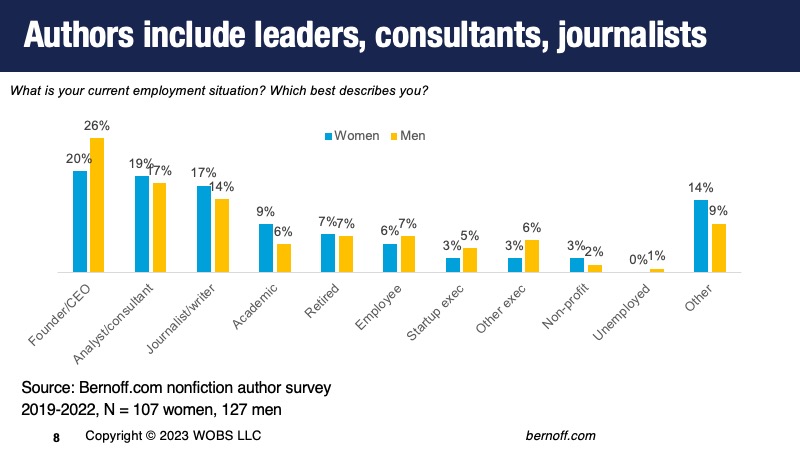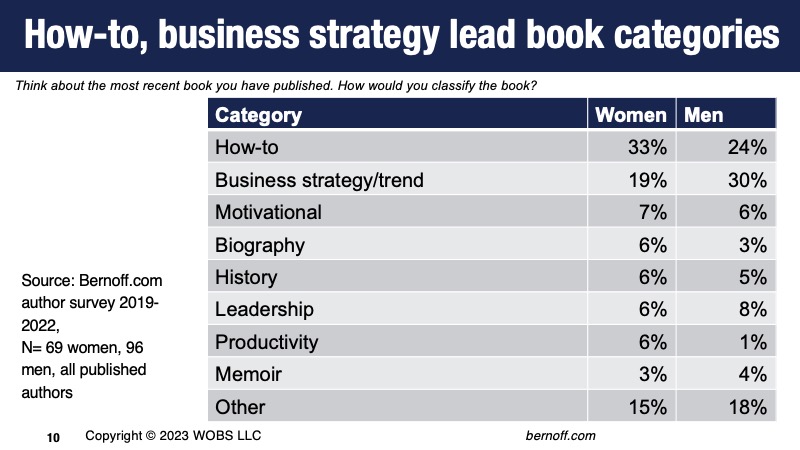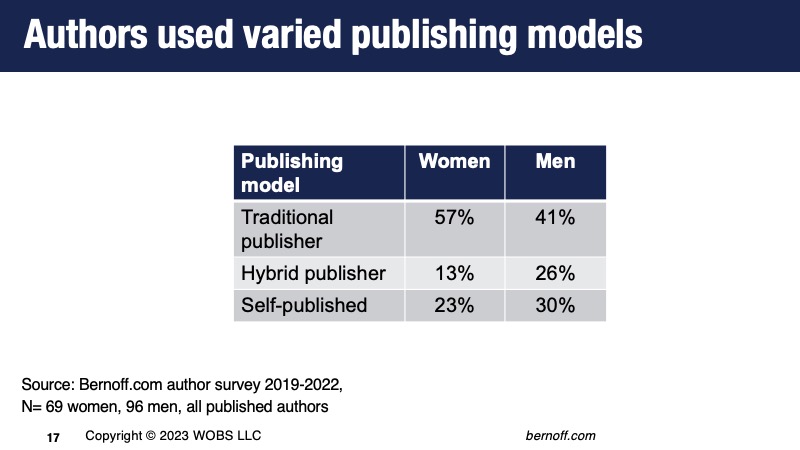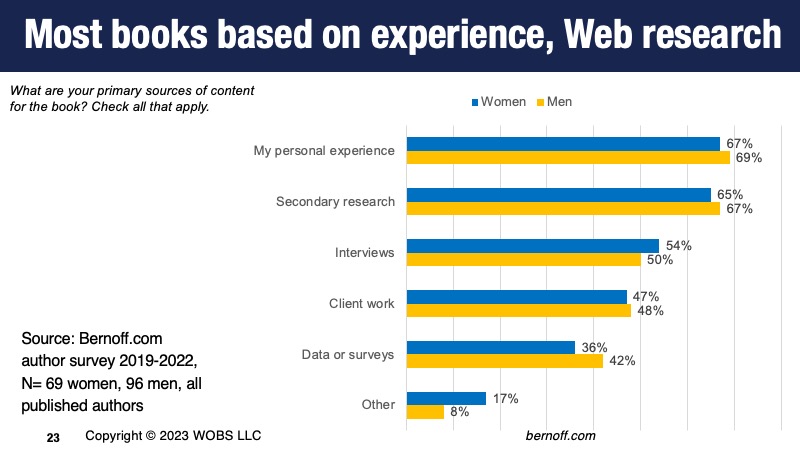Are women nonfiction authors getting a raw deal from publishers?
To prepare for two recent presentations to groups of women authors, I revisited my survey of over 200 nonfiction authors, examining whether their answers varied by gender. For the most part, women and men authors in my survey had the same experiences and used many of the same tactics. But one dramatic difference emerged: the median advances traditional publishers paid to the women in my survey were significantly lower.
What my survey revealed about attitudes among women authors
I conducted my survey during the years from 2019 to 2022. I reached 242 nonfiction authors, of which 107 were women and 127 were men, and 8 were unwilling to answer the gender question. Among those who had successfully published a book and told me their gender, 69 were women and 96 were men.
In examining the results I’m about to present, be aware that the sample sizes are small. I do not claimed to have reached a representative group of nonfiction authors, and the small samples can magnify random differences. The survey reached people through author groups on Facebook, followers of my blog, and recommendations from publishers and other friends I had; there’s no reason to believe that these sources would reach groups in which the women respondents were significantly different from the men. With those caveats in mind, it’s still revealing to see what gender differences appeared in my survey.
Among the authors I reached, both the women and the men had a median age of 52. Their distribution of careers was also similar, with CEO/founders, analyst/consultants, and journalist/writers most common. Among the published authors, 52% of the women and 62% of the men had published more than one book.

The distribution of types of books was also similar, although the women authors were a little more likely to have published how-to books, while the men were more likely to be authors of strategy and trend books.

Men and women authors had similar goals and success
The two top goals of authors of either gender were to share their knowledge and to boost their reputation. But when I asked them to choose a primary goal, they split: the men were more likely to want to boost their reputations, while the women were more likely to want to share knowledge. Women reported median sales of their most recent book at 5,833, while men reported 4,132. But among unpublished authors (38 women, 31 men), both genders’ median expectation of sales necessary for success was 5,000 to 10,000.


Writing and publishing methods showed some variation by gender
Among women authors responding, 23% said they had a coauthor, but only 13% of the men did. (I have no information on the gender of the coauthors.) Women were more likely to publish with a traditional publisher, while a majority of the men used a hybrid publisher or self-published.

Writing processes were similar
It was hard to spot significant differences by gender in how these authors worked. They used similar, mostly chaotic writing processes and based much of what they wrote on their personal experiences and secondary research. Among planning challenges, women were twice as likely as men to report struggles finding a publisher. And one in four women authors reported considering giving up at some point, as compared to only one in five of the men. Even so, these authors were optimistic: 93% of the women and 88% of the men agreed that writing a book was a good idea, and 71% of the women and 82% of the men planned to publish another book with five years.



The shocking difference in advance payments
Given the basic similarity in the types of authors I interviewed and the processes they used to create and publish their books, I didn’t expect to find huge differences in the economics. But I was wrong. My survey respondents included 78 traditionally published authors, evenly split between 39 men and 39 women. It’s difficult to draw conclusions from a group this small, but the levels of book advances they reported were radically different. The median advance payment to women was $7,600, versus $25,000 for the men. Among the men, 38% received advances in excess of $75,000, while only 13% of the women did.
It’s certainly possible that even though the men and women authors I surveyed were so similar in every other respect, by random chance I perhaps ended up reaching a whole lot of well-compensated male authors with traditional publishers, and a whole lot of poorly-compensated women authors in similar situations.
It’s also possible that there’s a major bias against women nonfiction authors in traditional publishing, resulting in offers with lower advance payments.
My own experience with women authors is that they have ideas every bit as good as or better than the men. Their promotional resources are equivalent. Their speaking careers and social media followings are comparable. The quality of their writing and their books is similar. And there are plenty of examples of women authors with breakout books and others on the verge of major success.
Obviously this needs more research. But for right now, if I hear that a woman author is not getting a fair shake from publishers, I’d say there’s one more piece of evidence to back that up.

Ah, thanks for sharing this, Josh. Alas, I am not surprised. There’s a lawsuit at Vassar about the college persistently paying women professors less than men. And Vassar’s identity is a champion of gender equality. The publishing industry? I expect no less. But it’s disheartening. That’s why I always try to amplify and showcase work by women business authors.
These numbers are troubling. I hope–and I’ll bet you do, too–that the sample sizes were not representative. But I suspect they were, for the reasons that Anne has explained.
Women have been found to be less aggressive when negotiating for a raise. Could it be that some of the men, and only men, fought to secure such generous advances? Did the publisher offer them $10,000 but the men said, “You’ll have to do better”?
As a woman, I can say the same applies in IT as well (I guess everywhere). And it’s not that I don’t negotiate, I do, and get a slightly better offer than the initial one, but never the same the men get (and I wonder often if what I ask for would be instantly given to a guy while for me it’s a no go). Plus, I’ve dealt with several bosses who were aware women were more efficient but they still paid men more. I honestly don’t understand where this disbalance is coming from.
Hello! Commenting to point out something about the “unwilling to share” option for the gender question – it sounds like they preferred not to answer and one reason that might be is they might have been nonbinary or use another concept/label to define their gender identity. There are more than two gender identities.
I love surveys so this research was really interesting for me, thank you for sharing!
For the biggest challenge question, were the respondents able to write in answers in Other? (if so, what were the common themes?)